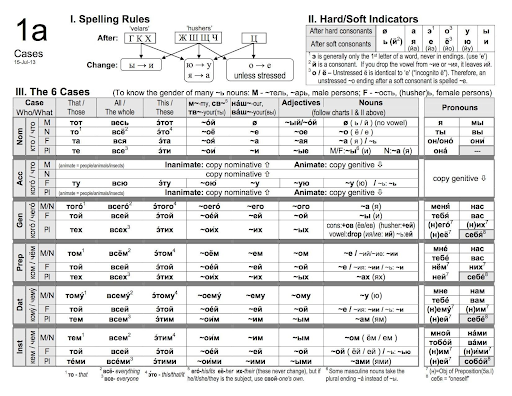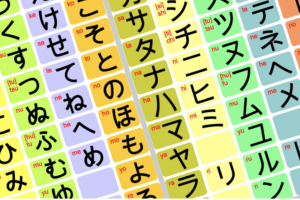
Explaining Russian Cases
To anyone learning or starting to learn Russian, I am sure they have encountered this monster of a chart at some point (and if you have not, welcome).
This is the chart for how to conjugate Russian cases. While the differences between the я дом and я в доме may look very small, it is the difference between saying I’m a house and I am in a house.
So, let’s explain what each case means, what it does, and how to use them!
Nominative Case Именительный падеж
Answers: кто/что [ktoh/chtoh] → who/what
The Nominative case can be thought of as the “Normal” case, the form in which all nouns are given in a Russian dictionary. In premise, this case identifies the subject of the sentence, without any additional meaning added to the noun.
Example:
Russian: мне нравится этот дом
Pronunciation: [mne nravitsya etot dom]
Translation: I like this house
In this case, the subject is дом [dom], house in a form the same as the dictionary
Genitive Case Родительный падеж
Answers: кого [kavoh] → whom/of whome
чего [chyvoh] → what/of what
aоткуда [atkooda] → from where
The Genitive case displays the cat of attribution, absence, and most important possession.
Example: Absence
Russian: у меня нет дома
Pronunciation: [u menya net doma]
Translation: I don’t have a home
Because you are stating that there is an “absence” of the house (aka you don’t have one) then the Genetive case is activated
Example: Possesion
Russian: Дом моего брата очень большой
Pronunciation: [dom moyego brata ochen’ bol’shoy]
Translation: My brother’s house is very big
In this sentence, the word брат [brat], brother is motivated to be брата [brata] displaying that my brother is the one possessing the big house.
Additionally, the Genetive case answers the question from where? As in, from where are you from? → Откуда ты? [otkuda ty]
If you were from Англия [angliya](England) then you would respond to the question by saying я из Англии [ya iz Anglii](I am from England)
As you can see, Англия became Англии
Dative Case Дательный падеж
Answers: кому [kamoo] → to whom
чему [chymoo] → to what
The Dative case essentially focuses upon the person/thing that is being given something or is being addressed.
Example:
Russian: Я купил его для моей подруги
Pronunciation: [ya kupil yego dlya moyey podrugi]
Translation: I bought it for my girlfriend
In this case, the word подруга [podruga] becomes подруги [podrugi] to signify that the girlfriend is the receiver of the action of buying.

Accusative Case Винительный падеж
Answers: кого [kavoh] → whom
что [chto] → what
куда [koodah] → where
The Accusative case is essentially the object of the sentence that is receiving the object directing; whether that is a buying, having, doing, etc event.
Example:
Russian: Мой папа купил мне камеру
Pronunciation: [moy papa kupil mne kameru]
Translation: My dad bought me a camera
In this sentence, because камера [kamera] is the focus of the sentence, and the one that is receiving the action of buying, it becomes камеру [kameru] in the accusative case.
Instrumental Case Творительный падеж
Answers: кем [kyem] → with whom
чем [chem] → with what
As the name implies, this case focuses on the instrument that is used to do something or anytime that you would use the word “with” in English
Example:
Russian: Я написал сочинение карандашом
Pronunciation: [ya napisal sochineniye karandashom]
Translation: I wrote an essay with a pencil
Prepositional Case Предложный падеж
Answers: о ком [ah kom] → about whom
о чем [ah chom] → about what
The final Russian cases correspond with position and prepositions. Simply, if you are attributing something to a certain space, you need to use the prepositional case.
Example:
Russian: Мяч на столе
Pronunciation: [Myach na stole]
Translation: The ball is on the table
In this case, стол is conjugated into the столе to reflect that something is being placed upon it.
Learn to Speak Russian Online
Though the chart might seem intimidating, with enough practice you’ll be speaking Russian in no time! LanguageBird specializes in customizable, one-to-one courses taught by native-speaking instructors designed to focus on your learning needs.
Whether you need extra practice mastering the chart above, or want to put your new skills to the test, contact us today and get the attention you deserve!





